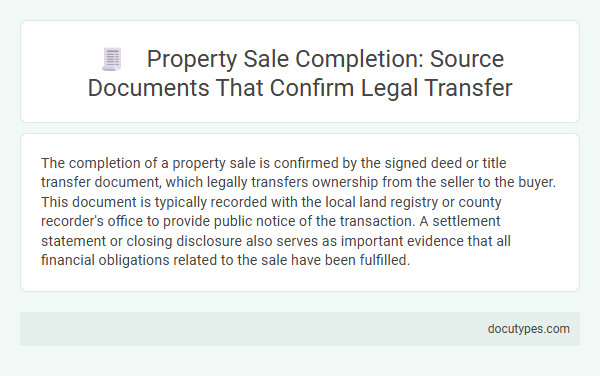The completion of a property sale is confirmed by the signed deed or title transfer document, which legally transfers ownership from the seller to the buyer. This document is typically recorded with the local land registry or county recorder's office to provide public notice of the transaction. A settlement statement or closing disclosure also serves as important evidence that all financial obligations related to the sale have been fulfilled.
Key Documents Required for Property Sale Completion
| Key Document | Description | Purpose in Property Sale Completion |
|---|---|---|
| Sale Deed | Legal document establishing the transfer of ownership from seller to buyer. | Confirms the completion of property sale and records the buyer as the new owner. |
| Title Deed | Original document proving seller's legal ownership of the property. | Verifies the seller's authority to sell the property and ensures clear title transfer. |
| Encumbrance Certificate (EC) | Certificate showing the property is free from monetary or legal liabilities. | Confirms no outstanding mortgages, loans, or claims on the property at sale time. |
| Occupancy Certificate (OC) | Government-issued certificate indicating property compliance with building regulations. | Ensures the property is legally approved and fit for possession. |
| Payment Receipts or Agreement | Documents evidencing financial transactions between buyer and seller. | Proves payment completion, essential for legal validation of sale. |
| Property Tax Receipts | Proof of paid property taxes by the seller. | Confirms no pending tax dues, enabling smooth transfer and registration. |
| No Objection Certificate (NOC) | Document from relevant authorities or housing societies approving sale. | Validates clearance from government or society restrictions for sale completion. |
Understanding the Legal Transfer Process
The source document that confirms the completion of a property sale is the deed or title transfer document. This legal instrument officially records the change of ownership from the seller to the buyer.
Understanding the legal transfer process involves recognizing that the deed must be signed, notarized, and recorded with the appropriate government office. Recording the deed creates a public record, ensuring the buyer's ownership rights are legally protected.
Sale Agreement: Foundation of Property Transactions
The sale agreement serves as the primary source document confirming the completion of a property sale. This legally binding contract outlines the terms, conditions, and obligations agreed upon by both buyer and seller. It provides clear evidence that the transaction has been finalized and ownership has been transferred.
Title Deeds: Proof of Ownership
What source document confirms completion of property sale? The title deed serves as the primary proof of ownership, officially recording the transfer of property rights. Your possession of the title deed definitively verifies the sale's completion and your legal ownership.
No Objection Certificate (NOC) for Property Sale
The No Objection Certificate (NOC) is a crucial source document confirming the completion of a property sale. This document ensures that all necessary approvals are obtained from the relevant authorities, validating the transaction.
- No Objection Certificate (NOC) - A formal document issued by the property developer or local authority stating that there are no objections to the sale or transfer of the property.
- Legal Clearance - The NOC verifies that your property does not have any pending dues, disputes, or encumbrances, guaranteeing a clear title for the buyer.
- Transaction Confirmation - Possession of the NOC signals that all legal formalities have been completed, confirming the successful transfer of ownership from seller to buyer.
Encumbrance Certificate: Clearing Property Liabilities
The source document that confirms the completion of a property sale is the Encumbrance Certificate. This certificate verifies that the property is free from any legal liabilities or encumbrances.
You must obtain the Encumbrance Certificate from the local land registry office to ensure all property liabilities are cleared before finalizing the sale. This document provides a detailed record of all transactions affecting the property over a specified period. It guarantees that the title is clear and protects you from future disputes related to ownership or claims.
Sale Deed Registration and Its Importance
The sale deed registration is the primary source document that confirms the completion of a property sale. This legal document formally records the transfer of ownership from the seller to the buyer.
- Sale Deed Registration - It is an official record maintained by government authorities that verifies the legitimacy of the transaction.
- Proof of Ownership - Registered sale deeds serve as indisputable evidence of property ownership and rights.
- Legal Protection - Registration protects both parties against future disputes or claims on the property.
Completion of property sale is legally recognized only after the sale deed is duly registered.
Mutation Certificate: Updating Land Records
The Mutation Certificate is the primary source document that confirms the completion of a property sale. It updates land records to reflect the new ownership details in government registries. This certificate ensures legal recognition of the property transfer, protecting the rights of the buyer.
Tax Clearance Certificate in Property Transfers
The source document that confirms the completion of a property sale is the Tax Clearance Certificate. This certificate verifies that all outstanding taxes related to the property transfer have been settled.
Your property transfer process is finalized once the Tax Clearance Certificate is issued by the relevant tax authority. It serves as official proof that the seller has fulfilled all tax obligations concerning the sale.
What Source Document Confirms Completion of Property Sale? Infographic

